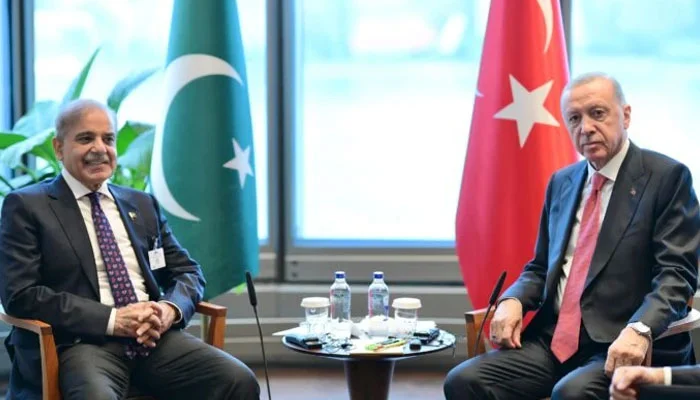Turkish President Recep Tayyip Erdogan’s upcoming visit to Pakistan in 2025 could mark a significant moment in regional geopolitics. This visit comes at a time when leadership across the Islamic world is reevaluating strategic policies to align with shifting global dynamics. In this evolving landscape, the key to survival and success lies in strong decision-making and adaptability, particularly as new trends emerge in the MENACASA (Middle East, North Africa, Central Asia, South & Southeast Asia) region.
A Shifting Global Landscape
The return of Donald Trump to the U.S. political stage coincides with the emergence of a new geopolitical framework in MENACASA. Iran, under President Masoud Pezeshkian, has taken a step back from regional power struggles, while Saudi Arabia has opted for a neutral stance, focusing on economic development without overextending its geopolitical influence. These shifts have created an opening for Türkiye, which is repositioning itself as a major regional player through its expanding soft, hard, and hybrid power strategies. Erdogan’s planned visits to Pakistan, Indonesia, and Malaysia demonstrate this renewed engagement.
Trump’s foreign policy approach is characterized by disruption, challenging established norms in politics, economics, and diplomacy. His presidency has already influenced key international events, including the Gaza ceasefire and political changes in Syria. These moves highlight the shifting priorities of major powers, particularly as Trump’s administration seeks to assert dominance through new tactics that diverge from Biden-era policies. The impact of these changes is being felt across the Middle East and beyond, as regional actors adjust their strategies accordingly.
The Role of Saudi Arabia, Iran, and Türkiye
Saudi Arabia has chosen a measured approach, focusing on economic growth while avoiding unnecessary entanglements in regional conflicts. Meanwhile, Iran has scaled back its involvement in geopolitical rivalries, effectively creating space for other influential players. Türkiye has seized this opportunity, with Erdogan taking a firm stance on issues like Gaza and supporting key allies in the region.
At the same time, the United States Agency for International Development (USAID) has faced setbacks, indicating a shift in U.S. foreign policy tools. Trump appears to be favoring a more aggressive approach, applying pressure through coercion rather than aid-based diplomacy. His close association with Elon Musk further highlights this strategy, as they push for dominance in the technology sector with projects like StarGate, countering advancements from Chinese tech firms such as DeepSeek-V3 and Alibaba’s Qwen 2.5. This realignment of priorities has led to increasing tensions within the Western alliance, as Trump’s confrontational stance toward Greenland, Canada, Mexico, the Middle East, the EU, and NATO reshapes global dynamics.
Will a New Alliance Emerge?
Given the ongoing disruptions in global politics, an important question arises: Will a new bloc emerge to counterbalance this instability? Historically, former Pakistani Prime Minister Zulfikar Ali Bhutto sought to establish a fourth bloc—distinct from the capitalist, socialist, and non-aligned movements—aimed at strengthening Islamic and developing nations. Today, a similar alliance could take shape, built on Arab-Turkish collaboration and centered around common priorities such as the establishment of a Palestinian state with East Jerusalem as its capital and resisting the displacement of Palestinians.
With Middle Eastern nations navigating external pressures, their ability to protect their strategic interests depends on strengthening regional cooperation and decision-making. As the U.S. moves away from liberalist approaches and reverts to a realist strategy, MENACASA countries must develop proactive policies to maintain their autonomy and security.
Technology, Diplomacy, and Future Risks
Geopolitical risk assessment increasingly demands a scientific approach, drawing insights from emerging technologies and predictive models. Monitoring trends and developments across MENACASA will be crucial in understanding how power dynamics evolve. The rise of technological advancements, military strategies, and diplomatic maneuvers highlights the need for a long-term vision to counter potential threats.
A key concern remains the expansionist policies of Israel, which could hinder the developmental progress of nations like Saudi Arabia and Türkiye. To counterbalance this, MENACASA countries must deepen alliances and pursue sustainable growth strategies. This will require a clear roadmap for cooperation, leveraging diplomatic, economic, and strategic strengths.
The Role of Türkiye and Eschatological Perspectives
In this evolving power struggle, leadership legitimacy and credibility are crucial. Türkiye, under Erdogan, has spent decades building its economic and military strength, positioning itself as a pillar of stability within the Islamic world. While not every Turkish policy may align with broader Islamic geopolitical objectives, Erdogan’s government has largely supported unity among Muslim-majority nations.
The importance of eschatological traditions in Islamic thought must also be considered. The disruption of Islamic unity, as witnessed in 2023-24, was a major setback. However, the remaining framework for securing stability, progress, and development must focus on strategic risk assessment and preparedness. Countries like Saudi Arabia, Iran, and Pakistan have already started adapting to these changes by refining their policies.
A Unified Approach for the Future
One of the biggest challenges facing MENACASA nations is maintaining cohesion and cooperation amid external pressures. The destruction of Gaza following the Saudi-Iran rapprochement demonstrated how unity among Islamic countries was perceived as a threat by external forces. As long as Türkiye and other influential nations work toward regional solidarity, their efforts must be supported.
Ultimately, a structured framework for addressing disruptions and threats is essential. This requires inclusive diplomacy, ensuring that no Islamic country is left isolated. Not all disruptions are negative—some can lead to necessary transformations—but managing them wisely is critical. Moving forward, MENACASA nations must prioritize stability, security, economic growth, and strategic alliances, ensuring that their decisions are future-proof and aligned with broader regional interests.





